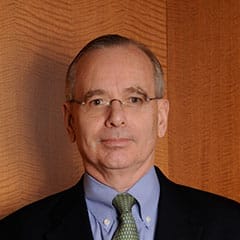Mike Delaney, WG’82, was working in M&A at Citicorp Investment Bank in the late ’80s when he fell in love with the work of partners at Citigroup Venture Capital. Every day was different for them. They never seemed to stop learning. “After much pleading on my part,” Delaney recalls, they asked him, a Penn State grad and former General Motors financial manager, to join them in 1989. The firm took the name Court Square Capital Partners and spun out of Citigroup in 2006. With about $6 billion in capital commitments, Court Square focuses on middle market buyouts.
WHARTON MAGAZINE: Why have you remained in private equity?
MICHAEL DELANEY: I have been with the same partnership now for 25 years, and as I think about it, I really do it for two reasons. One, the intellectual challenge. The interpersonal challenges of working with different management teams in a wide variety of situations. All of that is as valid today as 25 years ago.
Equally as important, I work with a group of people whom I have a tremendous amount of respect for. We take what we do very seriously, but we don’t take ourselves very seriously.
WM: What’s a favorite aspect of the job?
DELANEY: At this point in my career, I really enjoy mentoring younger partners and building the organization, adapting the partnership to be successful in what is an ever-evolving industry. The strategy that we deployed 30 years ago wouldn’t work today. The strategy we employed even 10 years ago would not be effective today.
We have to bring new skills into the partnership that we historically haven’t really needed, and we need to bring them in in a way that fits our culture so we don’t lose the magic that’s made us successful over such a long period of time.
WM: What new skills?
DELANEY: For a long time, we found a tremendous amount of success primarily being a very management supportive private equity firm. While we utilized third-party resources like operating consultants, it was really more ad hoc. We took a hard look at ourselves and determined that we really needed to internalize some of those skills, whether it be operational skills or accounting and systems skills.
WM: Do you have a favorite moment or success story?
DELANEY: It’s like having a dozen kids and someone asking you who your favorite kid is. Watching the management teams evolve over time and watching companies transform as a result of our partnerships with management is incredibly rewarding.
One of the great crimes of our industry is that we ultimately have to sell these companies.
WM: What advice would you give current students interested in PE?
DELANEY: I think they should approach a decision to get into private equity as they would approach any investment. They need to do due diligence on the profession, the firms and ultimately themselves. If it’s for the prestige and the money, I think they are making a mistake. If it’s because they love the day-to-day challenges, then that’s the reason to do it. Would you do this job if it paid minimum wage?
WM: What do you see as big challenges for the industry?
DELANEY: Clearly, one of the challenges you always have when you’re in the financial services industry is that money is fungible and flows to sectors that provide better returns. Private equity has always provided better returns. A lot of money flowed into the industry 10 years ago. Many GPs and LPs suffer as a result of that excess capital because some GPs lost discipline and and did deals they shouldn’t have.
Now we’re entering into a new phase, less of a growth phase and more of a stabilizing phase. LPs are a lot more particular about who they are investing with, so over time I think you’re going to see a lot more rationalization within the industry both with respect to the amount of money and the number of GPs.
There’s also a big generational shift going on within our industry. People like myself, I’m 60 years old … a lot of firms are facing real succession challenges.
Read the other “Pride of Private Equity” alumni profiles, as well as watch the video interviews with student leaders, here.

























